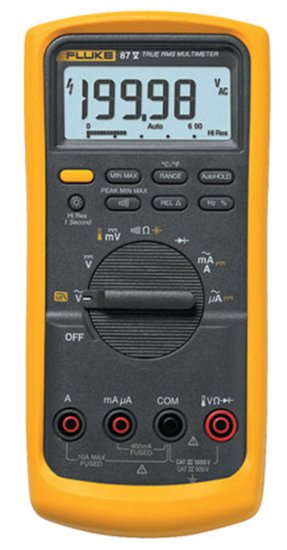What do you get from a $200 multimeter?
Thu 02 October 2014 by Fred CliftI was recently discussing with friends how I like Apple computers (e.g. the MacBook Pro I use for work) but have a hard time justifying the extra cost when in many cases I can get something 'good enough' for half the price.
And sometime around that conversation, the fact that I own and use a Fluke 87-V multimeter came up.

Considering the fact that I can drive 5 minutes from my house and buy a cheap multimeter, I had to stop and think. I do own several cheapies that I use regularly (e.g. one lives in my toolbox where it gets beat up a lot, one in the trailer, etc)
I do have training in electronics, but it's not what I do for a day job. My uses of a multimeter - do they justify 30x the cost for the fluke? So I decided to put together a list of what I have recently used the fluke for that I can't use the cheapys for.
I've had a couple of projects in the last few weeks that have involved using a multimeter: Repairing a pinball machine, and helping my son diagnose a malfunctioning robot-kit he was assembling.
Here are some of the things I got for my money:
-
Measures frequency (e.g. clock on PIC controller on robot)
-
Measures max/min/average from when I press a button to when I press it again - used to see if an AC relay was tripping while i was behind the pinball machine messing with connections in the backbox. I've also used this to help diagnose battery, cable, starter issues on my car. I can see the lowest voltage the battery produced under starter load.
-
INSTANT continuity checking/beeping - hook one end with alligator clip to solenoid terminal on flipper, quickly drag other lead across many contacts on remote connector/wire-bundle to find the right wire in seconds, without even having to look at the meter...
-
Quality leads that I can use on high-voltage stuff and not worry that I'm going to injure myself
-
High enough voltage on 'diode-check' mode to actually light up an LED, or in this case an IR-LED on the robot, while viewing it with my cell-phone-camera to see it light up (seriously fun - point your crappy-cell-phone camera at your IR remote control and see the leds light - https://www.youtube.com/watch?v=_m7454Xt-OI)
-
Capacitance testing
-
Auto-ranging is SOOOO nice - there is ONE DC setting - not 8 different DC ranges. The fluke is not the fastest on selecting the best range - I've seen faster, but I dont want to afford meters that are faster.
-
I didn't think this would be such a big deal... but AUTO-POWER-OFF has saved my batteries so many times.
One thing - I actually like the battery testing on my cheapy centech from harbor freight better. It uses a small load to actually measure current produced by the AA battery I'm testing. It is much more accurate than looking at voltage on it... Plus I worry much less about my kids testing batteries with a $6 multimeter - so that is what lives in the junk drawer in the kitchen.
All that aside, I could probably get most of that list from a $100 multimeter... For me, if you use a tool a lot, you should buy a great one and enjoy it. Did I just talk myself into buying a new macbook?